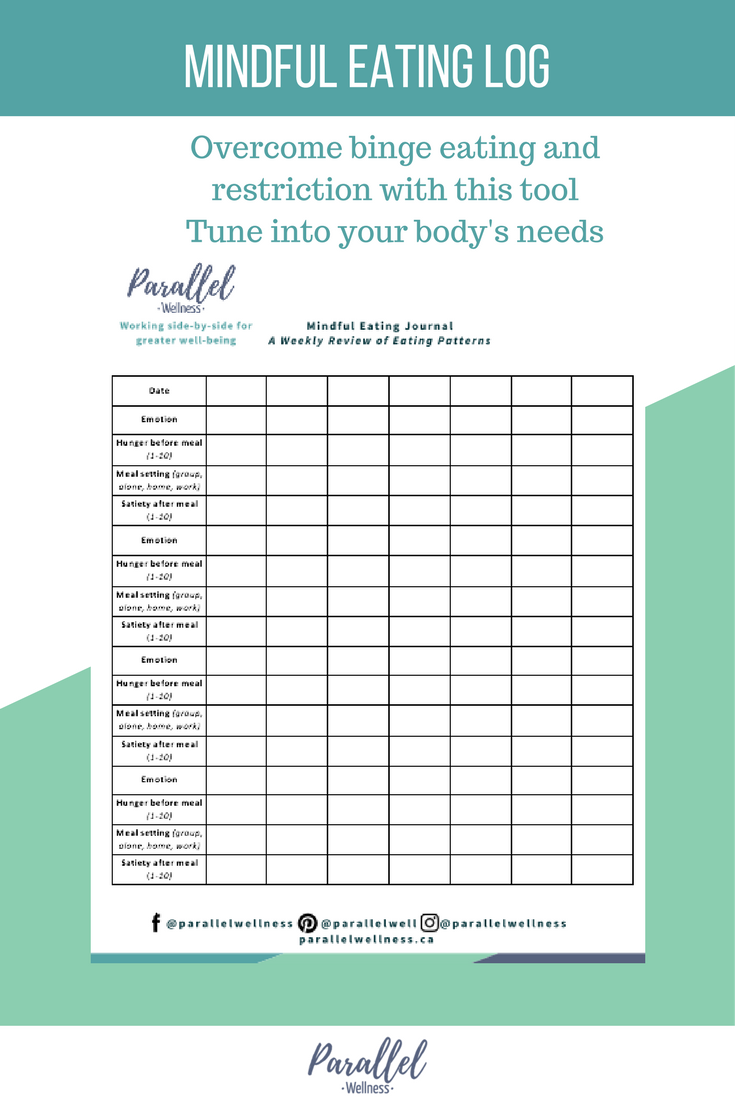Mindful eating is a key step in overcoming an eating disorder or disordered eating. As part of our work with clients struggling with binge eating and restriction, many clients express a disconnect between what their bodies tell them, and what their disordered eating voice is telling them. For many, eating has become ritualized, or even something to be dreaded because they associate it with a lack of control. If you’re wondering if you might have an eating disorder, read our article on 6 Signs to Be Aware Of, with regards to your eating beliefs and behaviours.
Regardless of which end of the spectrum you are on, developing a more mindful sense of your body’s cues of hunger, satiation and how your eating patterns are linked and influenced by your emotions is the first step in repairing your relationship with your body. This is called mindful eating. This is part of the shift from punishing and denying your body, to assertively standing up against your eating disorder and saying, “No, I don’t deserve to hurt myself. I want to trust my body.”
This mindful eating log can be used at any stage of recovery. Starting off, you may want to fill it out throughout the day to begin to recognize patterns in your day and eating behaviours. Once clients begin using the mindful eating log, they will report that after a day of restriction and stressful life events, they are more likely to binge in the evenings. This makes total sense! Your body has been deprived of essential nutrients throughout the day, you’ve likely got a case of the “hangries” and to top it all off, food is often a comfort in times of stress. By exploring these patterns through mindful eating, you can start experimenting with making minute changes that will significantly impact your emotional and physical well-being.
As you get deeper into your eating disorder recovery and the repair of your relationship with food and your body, through mindful eating, you’ll find that you are more in tune with the needs of your body. Work on taking brief moments throughout the day to check in with yourself and how your body is feeling. You’ll start to recognize when your sensation of hunger starts so you can respond earlier by eating for nutrition and not purely emotional reasons. You’ll also come to a place of being able to acknowledge your emotional reasons for turning to food and making a conscience decision about eating, rather than being controlled by your eating disorder.
I know, I make it sound so easy. I know it’s not easy by any means. The truth is, it is worth it. Mindful eating is an invaluable skill that will help you to start repairing your relationship with your body and food. Give it a try, and let us know what you think!
Click here for the Parallel Wellness Mindful Eating Log.
~ Meredith from Parallel Wellness
[themify_button style=”gray” link=”http://”]Book an Appointment[/themify_button]
Hey there!!
I'm Meredith MacKenzie, the founder of Parallel Wellness and a Registered Clinical Counsellor. Simply put, I love to talk about psychology, emotions and all the things that make us human. My goal for this blog is to share information, resources and a fresh perspective on what brings clients to our practice.

